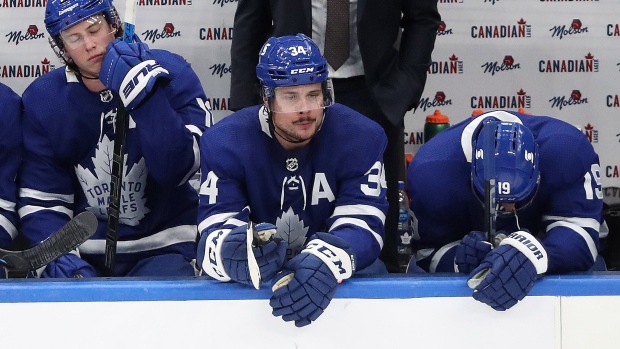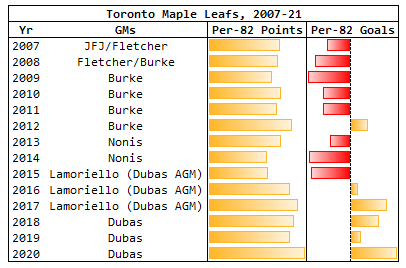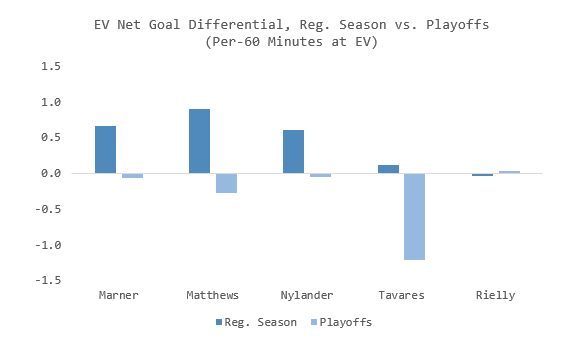Jun 3, 2021
Maple Leafs’ core owns this postseason collapse
The latest in a string of postseason collapses by the Toronto Maple Leafs must be owned by its underperforming core, writes Travis Yost.
By Travis Yost

Everyone who has watched one period of a Toronto Maple Leafs game thinks they have the fix for what ails the hockey club. That includes me, for the record.
These postmortems are going to continue unabated for quite some time. Among the topics I expect to be raised this off-season: the feasibility of trading a player like Mitch Marner or William Nylander, a persistent debate about adding more skill versus more grit, speculation about whether head coach Sheldon Keefe and/or general manager Kyle Dubas are the right people for their respective jobs, and how the team may navigate upcoming free agency.
No question should be off the table. This is a team that has disappointed year after year in the playoffs. At least in prior seasons you could point to a superior opponent or some competing factor that hampered Toronto’s chances at advancing. The Columbus loss last year, followed by the Montreal loss this year (in what, I reiterate, was a weak division), has ensured this dissection will continue for months.
The two most polarizing topics are Dubas’ data-driven approach and the wherewithal of the players on the roster. I have seen plenty of recent referendums on the job Dubas has done, and quite frankly, they are impossible arguments to swallow. Here’s why:

he Maple Leafs were terrible for many, many years. Then Brendan Shanahan, Lou Lamoriello and Kyle Dubas joined the front office, and the turnaround began. Lamoriello has since moved on to the New York Islanders and is having considerable success there; so, too, has Dubas in his absence.
You may have forgotten this from two weeks ago, but the Maple Leafs just finished their most impressive regular season in the modern era (2007-21). And if you were a day trader playing the stock market and looking at the trends, you would either hold or double down on your investment. Full stop.
Let’s put aside the front office for a moment. You will rightly point out that this team, despite whatever success it may have realized during the regular season, cannot get over the playoff hump. And you would be correct. No one wants to hear “let’s run it back” for the fifth year in a row, especially in a season where the team’s stars melted under pressure.
I think that is the most important part of this discussion by a considerable margin. The Maple Leafs' best players, the same players who have carried them to heights rarely seen for this organization for years, haven’t delivered when it matters most.
From Auston Matthews down, this team’s core consistently underwhelms in the playoffs. The lack of scoring – perhaps more so in Toronto than anywhere else – erodes a massive competitive advantage, and greatly reduces the team’s margin for error.
This is where Toronto’s front office is really going to make their money. Because for as much as I believe they built a very talented roster that should be a playoff club for the foreseeable future, running it back every year is untenable. Dubas may be correct in not reacting to shooting percentages in very small samples, but how long can you wait? Especially with a top-heavy lineup like this that can’t exactly rest on non-existent defensive laurels?
This table is one I keep coming back to. If we look at net goals for Toronto’s five core players, it’s clear how relatively ineffective they are come playoff time:

This is why the discussion about adding grit or talent further down the lineup is immaterial. Neither option will move the needle substantially because, at the end of the day, Toronto runs up huge point and goal differentials in the regular season off the performance of its stars. Come playoff time, every single one of those players is either in the red or fighting to break even. There are only two ways to win in the postseason if your top lines are getting outscored: your depth absolutely dominates, or your goaltender goes on a run for the ages.
At any rate, it’s hard to look at the personnel Dubas’ front office (and in a few cases, Lamoriello before him) has added and be upset.
The team is more talented than it’s ever been – we know this because they dominate during the regular season, driving up big goal differentials in the process. And they have done that for a few seasons now.
To the extent the Maple Leafs are breaking down relative to our expectations – well, that’s a comment on the player group more than anything else.
If you think the players on the roster are capable of winning a Stanley Cup, then this team has been victimized by poor luck in the playoffs. But if you think the wave of early postseason exits is a comment on the players and their ability to execute, then perhaps a major trade is in the cards for this organization.
Data via Natural Stat Trick, Evolving Hockey, NHL.com

